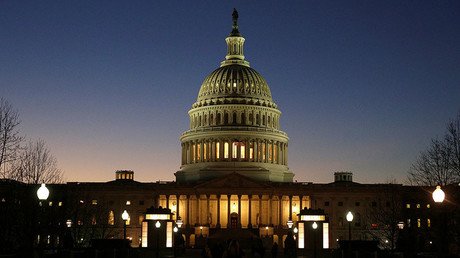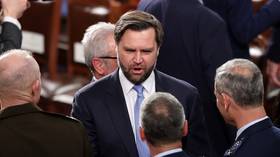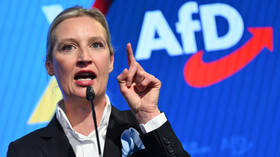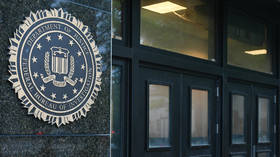‘Soviet active measures’: Hearing on Russian influence resurrects Cold War tropes
Though the leaders of the US Senate Intelligence panel said they would follow the facts and not jump to conclusions, their first open hearing on “Russian influence” in elections was short on the former and replete with the latter.
Thursday morning’s hearing of the Senate Select Committee on Intelligence proceeded from the assumption that Russia “sought to hijack our democratic process,” as Ranking Member Mark Warner (D-Virginia) said in his opening remarks, as if it was a proven fact, with one senator after another inquiring only as to the why and the how.
Warner set the tone for the hearing by claiming that “Russian President Vladimir Putin ordered a deliberate campaign, carefully constructed, to undermine our elections.”
“Russian propaganda outlets like RT and Sputnik successfully produced and peddled disinformation to American audiences” to achieve a preferred outcome of the 2016 vote, Warner claimed, adding that “this Russian 'propaganda on steroids' was designed to poison the national conversation in America.”
Does anybody have evidence of this fakenews that Russian trolls created that cost Clinton the election? #SenateIntelligenceCommittee
— Matthew Battle (@librab103) March 30, 2017
After treating these allegations as established facts, Warner concluded by accusing President Donald Trump of making “wild and uncorroborated accusations about wiretapping.”
Roy Godson, professor emeritus at Georgetown University, traced back “active measures” all the way back to Vladimir Lenin and the October Revolution, arguing that today’s government in Russia is merely continuing with Soviet practices.
Eugene Rumer, director of the Russia and Eurasia Program at the Carnegie Endowment for International Peace, said that RT’s 2011 coverage of Occupy Wall Street – referenced in the annex of a report by US intelligence agencies published in January – was the “perfect example” of how Russian propaganda used a genuine leftist movement to paint the US as a country in decline and “not a perfect society.”
Clint Watts, a fellow at the Foreign Policy Research Institute and the George Washington University, dated Russian “active measures” back to 2009, with an “influence campaign” starting in 2014, hacking in 2015 and “building audiences” in 2016, culminating with Trump’s electoral victory.
With Godson waxing long-winded about the Cold War and Rumer generally hedging his responses, Watts quickly emerged as the senators’ favorite witness.
“We are weak. We do not respond, we have no organized response as a country or even a policy towards Russia right now,” he said at one point.
Watts said he was a victim of Russian hacking himself, and at one point urged the committee to “follow the trail of dead Russians” in trying to track down Kremlin’s nefarious influence. The former US Army officer and ex-FBI agent also said he feared Russia would try to kill or discredit him for this testimony.
Not the 1st time someone in US is obsessed about dead Russians. Remeber the one who influenced US from the grave? https://t.co/KWn06lZ6c1https://t.co/8vqXHfywso
— Alexey Yaroshevsky (@Yaro_RT) March 30, 2017
Watts also urged the Departments of State and Homeland Security to refute fake news, and mainstream media to boycott WikiLeaks so “Russian influence dies on the vine.” He also suggested the creation of an independent agency, funded by social media companies, to provide a ratings system for news, and for the US intelligence community to relax its criteria for employing intelligence professionals and embrace open-source work, the kind he and his colleagues did using “three laptops… out of our house.”
Chairman Richard Burr (R-North Carolina) told Watts his recommendations “have not gone unnoticed.”
Has FireEye CEO /Mandiant founder Kevin Mandia, former Dir NSA Alexander, and Prof. @RidT, which really is an all-star cast for this stuff
— Pwn All The Things (@pwnallthethings) March 30, 2017
There was more speculation about Russian “active measures” in the afternoon hearing, which featured three cyber-security witnesses, including the former NSA chief General Keith Alexander. However, all three afternoon witnesses pushed back against some of the senators’ claims.
FireEye CEO Kevin Mandia noted that his company “didn’t see any evidence” of cyber intrusions that harmed the actual election process. He seemed fairly confident that APT28 was connected to Russian intelligence, but said his company could not make the attribution with certainty and without government confirmation.
“I think we would have seen that,” he told Sen Joe Manchin (D-West Virginia) when asked to speculate if anyone could have changed the actual votes.
Sen. Warner’s speculation about Russian propaganda targeting specific precincts in Wisconsin, Michigan and Pennsylvania encountered skepticism from Thomas Rid, professor at King's College in London.
“I haven’t seen a detailed analysis… that would be good enough to substantiate this assumption,” Rid told Warner. He also disagreed with Sen. Marco Rubio (R-Florida), telling him that “Kaspersky [Labs] is not an arm of the Russian government.”
.@RidT goes to bat for NYT, WaPo, says read them to avoid fake news. "If we can't trust the mainstream media, then we have lost."
— Dustin Volz (@dnvolz) March 30, 2017
General Alexander urged the US government to “engage and confront” Russia and set boundaries for cyberspace behavior. “We need to reach out and cool this down,” he said.
Mandia also warned that the US should not engage in a hacker war against Russia, as Moscow would win.
“Cyber on cyber, it feels like we’re in a glass house throwing rocks at a mud hut,” he told the senators.













